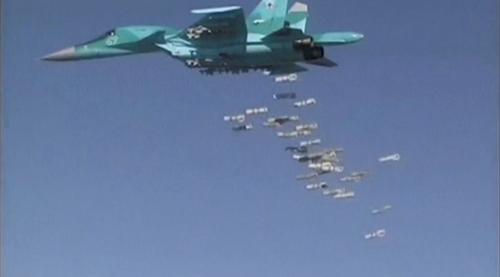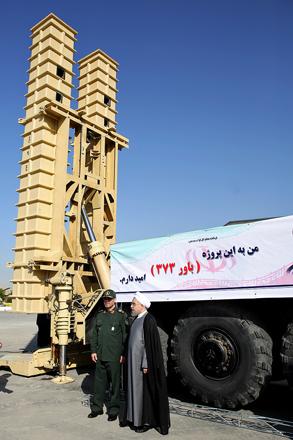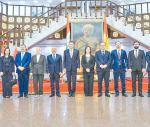You are here
Russia has stopped using Iran base for Syria strikes — Iran
By AP - Aug 22,2016 - Last updated at Aug 22,2016

A still image taken from video footage and released by Russia's defence ministry on Thursday shows a Russian Sukhoi Su-34 fighter-bomber based at Iran's Hamadan Air Base, dropping off bombs in the Syrian province of Deir Ezzor (Reuters photo)
TEHRAN, Iran — Russia has stopped using an Iranian air base for launching air strikes on Syria for the time being, Iran's Foreign Ministry spokesman said on Monday, just hours after the Iranian defence minister criticised Moscow for having "kind of show-off and ungentlemanly" attitude by publicising their actions.
Moscow, which had used the Shahid Nojeh Air Base to refuel its bombers striking Syria at least three times last week, confirmed that all Russian warplanes that were based in Iran have returned to Russia.
A statement issued by the Russian defence ministry said on Monday that as long as Iran agreed, Russia could use the Iranian air base again, "depending on the situation" in Syria.
Iranian Foreign Ministry spokesman Bahram Ghasemi told reporters in Tehran that the Russian air strikes on militants in Syria were "temporary, based on a Russian request”.
"It is finished, for now," Ghasemi said, without elaborating.
Last week, Russia announced it used the airfield, located some 50 kilometres north of the Iranian city of Hamedan. Iranian officials only confirmed Russia's presence a day later.
Earlier on Monday, state TV quoted Iran's defence minister as saying that Russia "will use the base for a very short and fixed span”. The comments by Gen. Hossein Dehghan came after he chastised parliament this weekend for asking questions about Russia using the base.
Responding to a question about why Iran didn't initially announce Russia's presence at the airfield, Dehghan appeared prickly on the state TV broadcast.
"Russians are interested to show they are a superpower to guarantee their share in political future of Syria and, of course, there has been a kind of show-off and ungentlemanly [attitude] in this field," he said.
Dehghan's remarks also suggest Russia and Iran initially agreed to keep Moscow's use of the air base quiet. Its announcement likely worried Iran's Sunni-ruled Mideast neighbours, which host American military personnel.
The Interfax news agency on Monday also quoted Russia's ambassador to Tehran, Levan Dzhagaryan, as confirming that all of Moscow's warplanes have been withdrawn from Iran. Dzhagaryan said, however, that he does "not see any reason" why the Russians can't use the Iranian base again.
For Iran, allowing Russia to launch strikes from inside the country is likely to prove unpopular. Many still remember how Russia, alongside Britain, invaded and occupied Iran during World War II to secure oil fields and Allied supply lines. But while Britain withdrew, Russia refused to leave, sparking the first international rebuke by the nascent United Nations Security Council in 1946.
Analysts have suggested Russia potentially leveraged Iran into allowing it to use the airfield over either economic or military interests, such as Tehran wanting to purchase Sukhoi-30 fighter jets or its deployment of Russian S-300 air defence missile systems. Russia initially held off on supplying the missile system to Tehran amid negotiations over Iran's contested nuclear programme.
Over the weekend, photographs of President Hassan Rouhani were published in Iranian state media near a Bavar-373 missile defence system. That system is designed to be the local equivalent of the S-300 — perhaps an Iranian signal back to Moscow that it's capable of defending itself without the Russian missile system.
In his comments, Dehghan said the Bavar-373 can hit targets at the height of 27 kilometres — the same height the S-300 can reach.
"When we make Bavar-373 operational, we will not need to purchase another high-altitude and long-range air defence system," he said.
Dehghan added that Iran still sees the Sukhoi-30 as "an appropriate fighting aircraft", though he acknowledged the US could seek to block any fighter jet deal. The UN resolution enshrining last year's nuclear deal with Iran prohibits the supply, sale and transfer of combat aircraft to Iran unless approved in advance by the Security Council.
"The issue of purchasing the fighters has been raised and we have not heard any negative answer," he said. "We are negotiating to learn how we can do this with the restriction that can be raised for the Russians."
Meanwhile, fighting continued on Monday in Syria. In the northern Syrian city of Hasakeh, clashes again erupted between Kurdish fighters and pro-government militias, according to the Kurdish Hawar News Agency. The government and the Kurdish movement have shared control of the city since the early years of the Syrian civil war.
Syrian government planes bombed Kurdish positions in Hasakeh last week as the struggle for predominance in the city escalated.
Related Articles
TEHRAN — Iran unveiled its new home-grown air defence system on Thursday at a time of increased tensions with the United States.Iranian offi
TEHRAN — Iran released images of its first domestically built long-range missile defence system on Sunday, a project started when the countr
TEHRAN — Iran’s advanced S-300 air defence system, delivered by Russia following a July 2015 nuclear deal after years of delay, is now opera

















